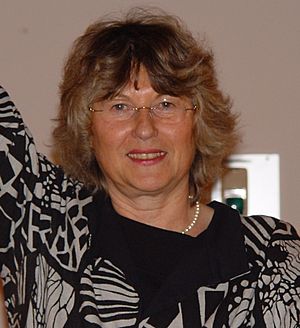Sigrid Metz-Göckel facts for kids
Sigrid Metz-Göckel (born August 18, 1940, died February 11, 2025) was a German expert in how people learn and how society works. She focused on topics like women's roles and gender studies. She was a professor at the University of Dortmund from 1976 to 2005. There, she started a special center for teaching methods. She also helped create the first university courses in Germany focused on women's studies in 1981.
Quick facts for kids
Sigrid Metz-Göckel
|
|
|---|---|

Metz-Göckel in 2007
|
|
| Born |
Sigrid Schneider
18 August 1940 Klein Peterwitz, Gau Silesia, Germany
|
| Died | 11 February 2025 (aged 84) |
| Education |
|
| Awards | Order of Merit of the Federal Republic of Germany |
| Scientific career | |
| Fields | |
| Institutions | University of Dortmund |
| Doctoral advisor | Helge Pross |
Contents
Early Life and Learning
Sigrid Schneider was born on August 18, 1940, in a place called Klein Peterwitz in Germany. Her father was a teacher, and her mother's name was Helene. When Sigrid was very young, her father died in World War II. Her mother then had to move with her three small children from Silesia. They lived in difficult conditions.
Moving and School
First, they lived in Upper Silesia, where Sigrid went to a Polish primary school. In 1950, her family moved to Aurich, and later that year, they moved to Hanover. In Hanover, she attended a school called Sophienschule.
University Studies
After finishing high school, Sigrid Metz-Göckel started studying economics at the University of Mainz in 1960. From 1961, she studied sociology at the Goethe University Frankfurt. She learned from famous thinkers like Max Horkheimer and Theodor W. Adorno. She finished her first degree in 1966.
Advanced Degrees
In 1972, she earned her Ph.D. from the University of Giessen. Her special areas were social psychology and political science. Her Ph.D. paper was about how teaching methods work in universities. After that, she worked as a research assistant. She also traveled to other universities to learn more, including places in Poland and the United States.
Career and Achievements
While working in Giessen, Sigrid Metz-Göckel became very interested in women's issues. She started attending seminars about the new women's movement in the mid-1970s. She then helped create several groups for women and began studying women scientists.
Starting a Didactic Center
In 1976, she became a professor in Dortmund. Her main goal was to create a special teaching center for three universities in the area. She successfully set up this center, which focused on women's and gender studies. She led this center until 2005.
Pioneering Women's Studies
In 1979, Metz-Göckel and her students started "Frauenstudien" (women's studies). This was a program for women who worked with other women, whether full-time or as volunteers. In 1981, "Frauenstudien" became an official course at the university. She was the scientific director of this program until 2002. She retired in 2005.
Supporting Women Scientists
As the leader of the teaching center, she worked hard to improve the situation for women scientists. She founded a working group for women scientists in North Rhine-Westphalia. She also helped start women's studies sections in important German sociology and education groups.
Research on Men
In the 1980s, she worked with another sociologist, Ursula Müller, on a study about men. This study looked at the lives of men aged 20 to 50 and how they viewed women. In 2004, she founded a group called the "Defiant Women Foundation."
Personal Life
Sigrid Metz-Göckel married psychologist Hellmuth Metz-Göckel in 1968. They did not have any children. She passed away on February 11, 2025, at the age of 84, after a short illness.
Awards and Recognition
In 1998, Sigrid Metz-Göckel received a special honor called the Cross of the Order of Merit of the Federal Republic of Germany. This award recognized her important contributions to society.

